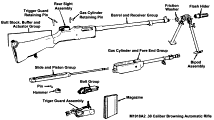| TECHNICAL DATA |
|---|
| | M1918A2 |
|---|
| Alternative Designations | BAR |
|---|
| Country of Origin | USA |
|---|
| Date Of Introduction | 1940 |
|---|
| Caliber | 0.30 in (7.62 mm) |
|---|
| Cartridge | .30-06 Springfield |
|---|
| System of Operation | Gas |
|---|
| Weight With No Magazine | 19.4 lb (8.8 kg) |
|---|
| Length | 47.8 in (1,214 mm) |
|---|
| Barrel Length | 24.07 in (611 mm) |
|---|
| Barrel Rifling | R.H., four grooves, pitch 1 in 10 inches (254 mm) |
|---|
| Safety Features | Manual safety lever |
|---|
| Trigger Pull | 6 to 10 lb (2.7 to 4.5 kg) |
|---|
| Magazine Capacity | 20 rounds |
|---|
| Weight of Empty Magazine | 0.44 lb (0.2 kg) |
|---|
| Weight of Full Magazine (M2 Ball) | 1.6 lb (0.7 kg) |
|---|
| Performance |
|---|
| Rate of Fire | Low rate: 350 to 450 rds/min
High rate: 550 to 650 rds/min
Sustained: 40 to 60 rds/min |
|---|
| Maximum Range | 3,500 yd (3,200 m) |
|---|
| Maximum Effective Range | 500 yd (457 m) |
|---|
| Sights |
|---|
| Front Sight | Blade |
|---|
| Rear Sight | Leaf with aperture rear sight, adjustable for windage |
|---|
| Sight Radius | 31.125 in (791 mm) |
|---|
DESCRIPTION
The M1918 is a selective fire (M1918, M1918A1) or fully-automatic (M1918A2), air-cooled, gas-operated, magazine fed, shoulder-type weapon.
Although the M1918 provided significant firepower to the rifle squad beyond the capabilities of the squad's other small arms, it
had some design limitations common to other rifles of its day. These limitations included a limited ammunition supply (only a 20
round box magazine), problems with overheating during continuous firing (because of a fixed barrel that could not be changed by the
operator), and a limited maximum effective range.
HISTORY
The M1918 BAR was designed by John Moses Browning during World War I as an automatic squad suppport weapon. The M1918A2, adopted
by the U.S. Army in 1940, saw extensive service during World War II and Korea.
The BAR was replaced by the M14A1 rifle and M60 general purpose machine gun in U.S. service.
VARIANTS
- M1918
-
1917. Original production model.
- Can fire either semi- or fully-automatic.
- No shoulder support plate or bipod.
- M1918A1
-
1937.
- Can fire either semi- or fully-automatic.
- Has a shoulder support plate hinged to the buttstock and a spike type bipod.
- M1918A2 (NSN 1005-674-1309)
-
1940. The M1918A2 is a fully automatic, air-cooled, gas-operated, magazine fed, shoulder-type weapon, designed primarily for use with a bipod.
The rifle can be easily disassembled into groups and assemblies. It is composed of the magazine, trigger guard assembly, bolt
group, gas cylinder and fore end group, slide and piston group, butt stock, buffer, and actuator group, bipod assembly, rear sight
assembly, and barrel and receiver group.
The rifle contains a cyclic rate mechanism which is housed in the stock and trigger guard mechanism. This mechanism allows two rates
of automatic fire, one at 550 rounds per minute (normal cyclic rate) and one at 350 rounds per minute (slow cyclic rate).
No provision has been made for semi-automatic fire other than by the quick release of the trigger.
AMMUNITION
Ammunition for the M1918 is issued in the form of a complete .30-06 Springfield round. A complete round (cartridge) consists of all the components
(cartridge case, bullet, propellant powder, and primer) necessary to fire the weapon once.
Click here for more information.
- .30 M1 Tracer
- .30 M2 Ball
- .30 M2 Armor Piercing (AP)
- .30 M14 Armor Piercing Incendiary (API)
- .30 M22 Frangible Ball
- .30 M25 Tracer
- .30 M40 Dummy
- .30 M1909 Blank
More M1918 Art

M1918A2 major groups, assemblies, and components.
Click on image to see full size: 865x485, 29K, GIF

